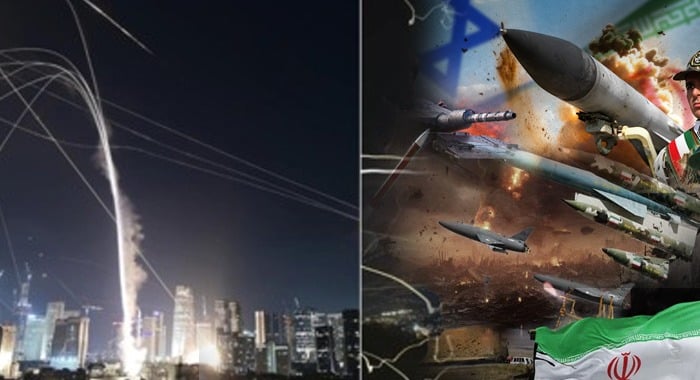In a dramatic escalation of hostilities, Iran launched another powerful wave of missile and drone attacks deep into Israeli territory in retaliation for Israeli airstrikes on Tehran, including direct hits on Iran’s Ministry of Defence headquarters and facilities suspected to be linked to its nuclear program.
According to Iranian state media and international observers, Iran’s Islamic Revolutionary Guard Corps (IRGC) targeted multiple strategic locations inside Israel, including military infrastructure, energy facilities, and urban centres. The attacks continued through the night into Sunday morning, catching Israel’s much-touted air defence system off guard.
“We struck at the heart of Israeli military logistics and energy infrastructure,” the IRGC stated in an official communique. “If aggression continues, our response will grow in scale and intensity.”
Israel’s Defenses Struggle Under Heavy Fire
Despite the presence of the Iron Dome and David’s Sling defence systems, Israeli officials admitted that the volume and intensity of the Iranian barrage overwhelmed their layered missile defense, allowing projectiles to slip through and hit civilian and strategic targets.
At least 13 people were killed across Israel, according to the Magen David Adom emergency service, with more than 180 injured and several still missing. Among the dead were two children, killed when a missile struck a residential building near Tel Aviv.
Israeli police commander Daniel Haddad said,
“The scale of damage and the number of direct hits inside Israel indicate a serious breach of our air defence capabilities.”
Scenes of Chaos and Devastation
In northern Israel’s Tamra town, four people were killed and 24 injured when a missile collapsed part of an apartment complex. In the central city of Rehovot, 42 were wounded in separate strikes. Eyewitnesses reported widespread panic, shattered glass, and collapsed buildings. Streets were littered with debris and charred vehicles, as rescue teams used drones and thermal cameras to search for survivors.
“This is the most intense attack we’ve ever faced,” said a rescue worker near Tel Aviv. “The system was simply not ready for this scale.”
Tehran Warns of Broader Response
The IRGC claimed it also targeted Israeli fuel depots and energy hubs, including facilities that power airbases. One confirmed hit caused a fire at the Haifa oil refinery, disrupting operations. Israeli authorities confirmed damage to refining pipelines, though they reported no casualties at those sites.
In a stern warning, the IRGC said,
“If Israel continues its military aggression, the next wave will be broader and more devastating.”
Iranian officials reported that over 78 people had died in earlier Israeli strikes on Tehran, and more than 300 were injured. The airstrikes also caused fires at Iranian oil refineries and gas processing plants, marking a sharp turn in the scale of the conflict.
Global Concerns and Trump’s Threat
The growing conflict has sent shock-waves across the region. Former U.S. President Donald Trump, who is currently seeking reelection, issued a sharp warning to Iran on social media platform Truth Social:
“If Iran attacks any U.S. assets or allies, it will face the full force of the American military like never before. We did not authorize Israel’s strike, but we will not tolerate attacks on America.”
Meanwhile, Tehran warned U.S. allies in the region that any effort to intercept Iranian missiles would be seen as an act of war, potentially expanding the conflict into a broader regional confrontation.
Despite calls for de-escalation from the UN, China, Russia, and the EU, the Israeli cabinet is reportedly weighing expanded operations inside Iran and its regional proxies.
Civilians on Edge, Airspace Closed
Israel’s airspace remained closed for a third consecutive day, with all civilian flights grounded. Residents of Tel Aviv, Jerusalem, and northern towns reported air raid sirens sounding throughout the night, as missiles streaked across the skies.
The conflict now appears to be entering a dangerously unpredictable phase, with both sides trading increasingly bold strikes and no diplomatic resolution in sight.





